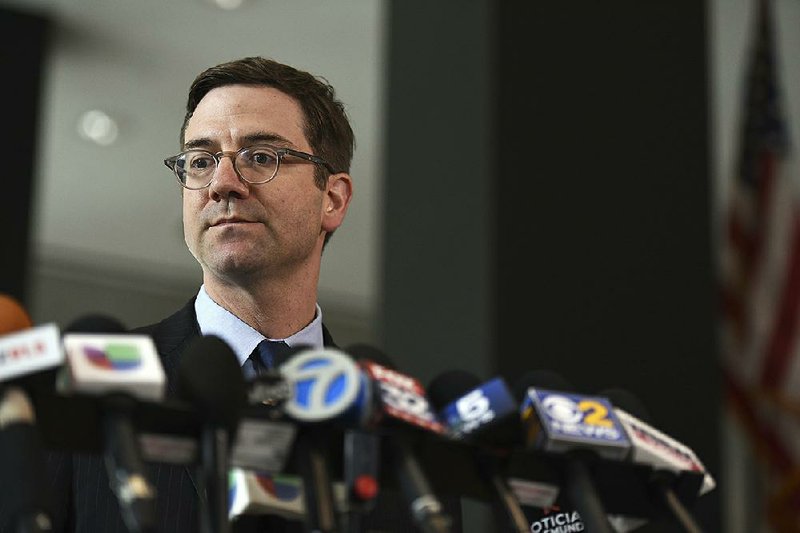Chicago Mayor Rahm Emanuel announced that the city was suing the Justice Department over a plan to withhold federal public safety grants to jurisdictions that adopt certain "sanctuary city" policies.
Hours later, Attorney General Jeff Sessions hit back at Chicago, saying President Donald Trump's administration "will not simply give away grant dollars to city governments that proudly violate the rule of law and protect criminal aliens at the expense of public safety."
"So it's this simple: Comply with the law or forego taxpayer dollars," he said in a toughly worded statement.
A 46-page lawsuit against the government was filed in U.S. District Court in Chicago a day after Emanuel announced the litigation and said the city won't "be blackmailed" into changing its values as a city welcoming of immigrants.
The lawsuit, which the city filed Monday, centers on new guidance the Justice Department issued last month requiring recipients of Edward Byrne Memorial Justice Assistance grants to give federal immigration authorities unfettered access to jails and to notify them 48 hours in advance of plans to release an inmate wanted on an immigration detainer. The lawsuit argues that the requirements "federalize" local jails and violate the constitutional rights of inmates, according to a statement.
"Chicago will not be blackmailed into changing our values, and we are and will remain a welcoming City," Emanuel said in a statement late Sunday. "The federal government should be working with cities to provide necessary resources to improve public safety, not concocting new schemes to reduce our crime fighting resources."
"The government," the lawsuit says, can't "unilaterally" set new conditions that weren't approved by Congress "and that would federalize local jails and police stations, mandate warrantless detentions in order to investigate for federal civil infractions, sow fear in local immigrant communities, and ultimately make the people of Chicago less safe."
A first order of business now that Chicago's suit has been filed will be to ask a judge to put a freeze on the policy as the civil case plays out, said Edward Siskel, the head of City Hall's legal department. That request for a preliminary injunction could be made within days.
The lawsuit, which names Sessions, seeks to remove the immigration-related conditions for the grant applications.
The lawsuit is the latest strike in an ongoing battle between the Trump administration and cities with policies that bar close cooperation with federal authorities to enforce immigration laws, often known as sanctuary cities. Administration officials say the policies undermine efforts to root out and deport violent criminals who are in the country illegally, while the cities say the close cooperation federal authorities demand undermines public trust and forces them to violate the rights of their residents.
Chicago is among several jurisdictions already locked in a legal battle with the Trump administration over an executive order, largely blocked by a federal court, aimed at withholding federal funds from sanctuary cities.
In announcing the much narrower new policy this month, Sessions said the new restrictions are necessary to ensure that immigration authorities have the information they need to keep citizens safe.
City authorities say the policies help encourage residents of the immigrant community to inform police when they are victims of crimes.
"If Chicago submits to the Department's demands, it will forfeit decades' worth of trust and goodwill that its police force has built in the communities it serves," the new lawsuit argues. "And as those decades of experience show, that kind of trust, once lost, is lost forever."
Sessions alluded to arguments also made by Trump that enforcing immigration laws can reduce crime. He calls Chicago's "hostility" to such laws especially "astounding" given that numbers of homicides in the city in 2016 outpaced the numbers in New York and Los Angeles.
"The city's leaders cannot follow some laws and ignore others and reasonably expect this horrific situation to improve," Sessions said.
He also characterized Emanuel as complaining it would have to reorder longstanding policies to conform.
"But that's just what Chicago needs: a recommitment to the rule of law and to policies that roll back the culture of lawlessness that has beset the city," Sessions said.
Chicago received $2.3 million in Byrne grants last year. The grants have been used in previous years to purchase equipment, police vehicles, radios and Tasers.
While the grant money amounts to a fraction of Chicago's public safety budget, Emanuel has said fighting the government now could help prevent the withholding of more money later.
Information for this article was contributed by Sandhya Somashekhar of The Washington Post; and by Michael Tarm and Sophia Tareen of The Associated Press.
A Section on 08/08/2017

